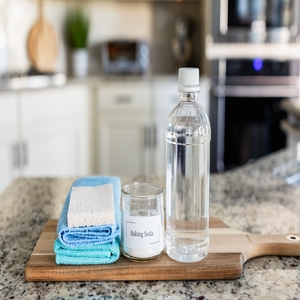
Looking for a natural, eco-friendly way to clean your kitchen, bathroom, and other areas of your home? A simple mixture of distilled white vinegar and water can work wonders for everyday messes. In this guide, you’ll learn how to make your own vinegar cleaning spray, how to use it safely on different surfaces, and which materials you should never use vinegar on.
How to Make Vinegar Cleaning Solution
To prepare the basic cleaner:
-
Pour 1 cup (240 mL) of distilled white vinegar into a 16 oz (470 mL) spray bottle
-
Add 1 cup (240 mL) of water
-
Close the bottle and shake gently
Optional Add-ons:
| Option | Benefit |
|---|---|
| 3 drops of tea tree oil | Antifungal & disinfectant |
| 3 drops of grapefruit or peppermint oil | Pleasant, fresh scent |
| Lemon rinds soaked in vinegar for 2 weeks | Natural lemon fragrance |
You can also use apple cider vinegar instead of white vinegar—just ensure the ratio is still 1:1.
How to Clean Using Vinegar Solution
Kitchen Surfaces:
Spray the mixture on countertops and stovetops and wipe clean with a lint-free cloth. (Avoid granite, marble, and stone surfaces.)
Refrigerator:
Empty your fridge, spray the solution on the shelves, let sit for a few minutes, then wipe down.
Microwave:
Fill a small bowl halfway with the mixture and heat for about 4 minutes until it boils. Allow it to cool, then wipe down the interior.
Bathroom Fixtures:
Spray on sinks, faucets, and toilets. Wipe away with a clean rag.
Shower Walls & Doors:
Spray and wipe as usual for a daily refresh.
Windows:
Spritz the solution onto glass and buff clean with a microfiber cloth. For streaks, try using ¼ cup vinegar + 2 tsp dish soap + ½ cup distilled water.
Carpet Stains & Odors:
Spray directly on the stain and blot it out with a cloth. For odors, spray and let sit to neutralize unpleasant smells.
Computer Screens (Acer/Samsung):
Lightly spray on a cloth (never directly on the screen) and gently wipe. Do not use pure vinegar on touchscreen devices.
What Not to Clean with Vinegar
-
Marble, granite, stone, and ceramic surfaces – vinegar can permanently etch or dull the finish.
-
Wood floors and wooden furniture – vinegar can damage the finish and the wood.
-
Kitchen knives – vinegar can corrode the metal over time.
-
Rubber parts (e.g., in washing machines or blenders) – vinegar breaks down rubber components.